One of the most prolific and talented composers to ever work in gaming, Tokuhiko “Bo” Uwabo is a man who seemingly lives in the shadows. Born on April 26, 1960, he studied agriculture at the University of Tsukuba before arriving at Sega in 1985. For the next 10 years, he scored or had a hand in the sound design of some of the greatest titles in Sega history. Credited with roles in sound, programming, support, and production, he has been associated with games made by Sega, Sonic Team, and even Overworks. Still, he’s never received any accolades from the gaming press and is barely a footnote in the industry’s history. Who is Bo? Where has he gone? Does he still even compose game music?
 The man who went by the names “Bo” and “Noah Toku” has an extensive gameography, spanning from 1986 to 1994. During that time frame, he was responsible for some of the most memorable music ever written for a game. When you think of the influence and popularity of most of the titles he worked on, it’s hard to believe that he never got as much attention as other Sega wonder boys (no pun intended), like Yuji Naka and Yuzo Koshiro did. In 1995, Uwabo moved over to Sega Europe but returned to Japan less than two years later, and he left the company for good in 1997. For the next decade, he moved between different positions at several companies, until he joined Winlight Co. Ltd. in 2007, a game studio that specializes in mobile games. As a director, Uwabo has been with the company since then, becoming the managing director of its Singapore operation in July of 2011.
The man who went by the names “Bo” and “Noah Toku” has an extensive gameography, spanning from 1986 to 1994. During that time frame, he was responsible for some of the most memorable music ever written for a game. When you think of the influence and popularity of most of the titles he worked on, it’s hard to believe that he never got as much attention as other Sega wonder boys (no pun intended), like Yuji Naka and Yuzo Koshiro did. In 1995, Uwabo moved over to Sega Europe but returned to Japan less than two years later, and he left the company for good in 1997. For the next decade, he moved between different positions at several companies, until he joined Winlight Co. Ltd. in 2007, a game studio that specializes in mobile games. As a director, Uwabo has been with the company since then, becoming the managing director of its Singapore operation in July of 2011.
Gameography
Alex Kidd in Miracle World (Master System, 1986)
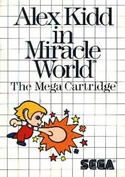 Probably Sega’s first real attempt at a mascot to rival Mario, Alex Kidd in Miracle World is actually a pretty darn good game. There were lots of gadgets and stages to keep things interesting. Bo’s score was very crisp and bouncy, making the most out of the Master System’s FM sound chip. The music was entirely scored by Bo, although most people were unable to finish the insanely hard game to see the credits. Alex’s classic theme was brought back for the Genesis sequel Alex Kidd in Enchanted Castle when the system launched in 1989, but Bo had no part in the game itself. Miracle World was the only game in the series to be scored by Bo, which is a shame, since it would have been interesting to see him evolve the themes as the series progressed. It may have also helped keep the franchise alive, as it quickly died out once Sonic arrived.
Probably Sega’s first real attempt at a mascot to rival Mario, Alex Kidd in Miracle World is actually a pretty darn good game. There were lots of gadgets and stages to keep things interesting. Bo’s score was very crisp and bouncy, making the most out of the Master System’s FM sound chip. The music was entirely scored by Bo, although most people were unable to finish the insanely hard game to see the credits. Alex’s classic theme was brought back for the Genesis sequel Alex Kidd in Enchanted Castle when the system launched in 1989, but Bo had no part in the game itself. Miracle World was the only game in the series to be scored by Bo, which is a shame, since it would have been interesting to see him evolve the themes as the series progressed. It may have also helped keep the franchise alive, as it quickly died out once Sonic arrived.
Fantasy Zone (Master System, 1986)
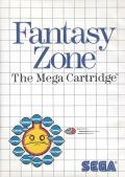 Another in a great series of arcade ports for the Master System by Sega, Fantasy Zone was a great shmup before most people even knew what shmups were. Bright, colorful graphics, big bosses, and one of the most recognizable soundtracks in gaming. Bo really did a fine job converting Hiroshi Kawaguchi’s soundtrack, and most of the themes have become instant Master System classics. Opa-Opa’s theme, for example, has been featured in almost every incarnation of the game, including the Mega Drive sequel Super Fantasy Zone, and was even a bonus track in Sonic Team’s Dreamcast classic Samba de Amigo. Shmups in general went on to feature heavy, guitar-laden soundtracks, but Fantasy Zone proved that a great score can be both light and happy and still be great for saving the universe.
Another in a great series of arcade ports for the Master System by Sega, Fantasy Zone was a great shmup before most people even knew what shmups were. Bright, colorful graphics, big bosses, and one of the most recognizable soundtracks in gaming. Bo really did a fine job converting Hiroshi Kawaguchi’s soundtrack, and most of the themes have become instant Master System classics. Opa-Opa’s theme, for example, has been featured in almost every incarnation of the game, including the Mega Drive sequel Super Fantasy Zone, and was even a bonus track in Sonic Team’s Dreamcast classic Samba de Amigo. Shmups in general went on to feature heavy, guitar-laden soundtracks, but Fantasy Zone proved that a great score can be both light and happy and still be great for saving the universe.
Space Harrier (Master System, 1986)
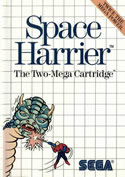 I remember walking into the local arcade in Florida and hearing that booming “Get ready!” coming at me from the back of the room. I’d never seen a machine like Space Harrier before and was quickly enthralled by its lightning-fast game play and great graphics. When I found out that it was coming for my beloved Master System, it became an instant purchase. Though scaled down quite a bit, the game retained all the magic of the coin-op and even had a few surprises! The music has always had a special place in my heart and even through the lousy RF connection on my TV, it sounded great. Kawaguchi was quite adept at composing music that fit the overall tone of the game and Bo’s conversion work in Space Harrier is an excellent example of how the Master System could emulate the arcade experience where it counted. Speedy riffs and spacey tones gave life to the Fantasy Zone (weird name coincidence?) and made you want to see just how much volume that little TV speaker could handle.
I remember walking into the local arcade in Florida and hearing that booming “Get ready!” coming at me from the back of the room. I’d never seen a machine like Space Harrier before and was quickly enthralled by its lightning-fast game play and great graphics. When I found out that it was coming for my beloved Master System, it became an instant purchase. Though scaled down quite a bit, the game retained all the magic of the coin-op and even had a few surprises! The music has always had a special place in my heart and even through the lousy RF connection on my TV, it sounded great. Kawaguchi was quite adept at composing music that fit the overall tone of the game and Bo’s conversion work in Space Harrier is an excellent example of how the Master System could emulate the arcade experience where it counted. Speedy riffs and spacey tones gave life to the Fantasy Zone (weird name coincidence?) and made you want to see just how much volume that little TV speaker could handle.
Zillion & Zillion II: The Tri Formation (Master System, 1987)
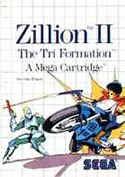
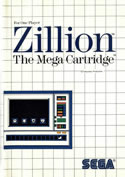 Ask a Master System fan to name their favorite games and Zillion is sure to be in the top five. Using Metroid-like game play, the game is famous for being hard and long. Being able to change between J.J., Champ, and Apple was very cool at the time and actually made you think for a change, as opposed to just blasting your way from screen to screen. The soundtrack was very tense and action-oriented, which made searching for those key cards even more nerve-wracking. Though Sega changed the game play formula a bit for the sequel, the music is as good as ever.
Ask a Master System fan to name their favorite games and Zillion is sure to be in the top five. Using Metroid-like game play, the game is famous for being hard and long. Being able to change between J.J., Champ, and Apple was very cool at the time and actually made you think for a change, as opposed to just blasting your way from screen to screen. The soundtrack was very tense and action-oriented, which made searching for those key cards even more nerve-wracking. Though Sega changed the game play formula a bit for the sequel, the music is as good as ever.
Overclocked Remix has some great remixes that you should download now!
Phantasy Star (Master System, 1987)
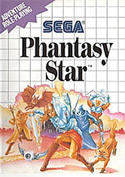 This is a title that needs no introduction. By far the best RPG on the Master System and one of the greatest of all time, Phantasy Star set the bar for other games in the genre for years to come. As the music composer, Bo went above and beyond anything he had done to this point. Pushing the system’s audio capabilities to their limits, virtually the entire soundtrack is a classic. From the overworld theme to any one of the three dungeon pieces, the whole Algol Star System can be defined by his music. Many of the songs from Phantasy Star were remixed or rescored for soundtrack CDs that are very rare now and some tunes (including my favorite dungeon theme) were incorporated in the series’ final 16-bit incarnation. Truly one of gaming’s greatest scores, Phantasy Star remains one of the high points in Bo’s career.
This is a title that needs no introduction. By far the best RPG on the Master System and one of the greatest of all time, Phantasy Star set the bar for other games in the genre for years to come. As the music composer, Bo went above and beyond anything he had done to this point. Pushing the system’s audio capabilities to their limits, virtually the entire soundtrack is a classic. From the overworld theme to any one of the three dungeon pieces, the whole Algol Star System can be defined by his music. Many of the songs from Phantasy Star were remixed or rescored for soundtrack CDs that are very rare now and some tunes (including my favorite dungeon theme) were incorporated in the series’ final 16-bit incarnation. Truly one of gaming’s greatest scores, Phantasy Star remains one of the high points in Bo’s career.
Ys: The Vanished Omens (Master System, 1988)
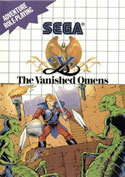 Ah, Falcom’s Ys series. One of my favorites and an enduring franchise that is coming back in a big way. First getting its start on the Famicom and Master System, the game was later ported to the Turbo-Grafx. While the soundtrack for the Master System version pales in quality to its CD counterpart, the fact that most of the themes originated here shows the vision and talent that the compact disc format let run wild. Bo was co-composer for Ys (part of group called Sound Team JDK) along with gaming legend Yuzo Koshiro (look for him in a future edition of Sega Stars). Although regarded as inferior to the Famicom release, the Master System cart was the only one brought stateside until Books I&II came out. I still like the FM charm Sega’s version has, as it was the first one I played. An interesting note is that Yuzo Koshiro had nothing to do with the spectacular Turbo-Grafx CD rendition of the soundtrack.
Ah, Falcom’s Ys series. One of my favorites and an enduring franchise that is coming back in a big way. First getting its start on the Famicom and Master System, the game was later ported to the Turbo-Grafx. While the soundtrack for the Master System version pales in quality to its CD counterpart, the fact that most of the themes originated here shows the vision and talent that the compact disc format let run wild. Bo was co-composer for Ys (part of group called Sound Team JDK) along with gaming legend Yuzo Koshiro (look for him in a future edition of Sega Stars). Although regarded as inferior to the Famicom release, the Master System cart was the only one brought stateside until Books I&II came out. I still like the FM charm Sega’s version has, as it was the first one I played. An interesting note is that Yuzo Koshiro had nothing to do with the spectacular Turbo-Grafx CD rendition of the soundtrack.
Space Harrier II (Genesis, 1989)
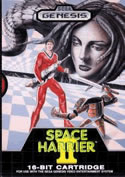 Released along with Sega’s new console, Space Harrier II brought back Harrier and all those aliens you only thought you’d see after smoking something illegal. With expanded graphics and stereo sound, the Genesis-exclusive sequel’s music sounded better than ever. Rather than just rehash the original’s score, Bo composed entirely new songs, including and awesome theme for level one that still sticks to front of my mind like mental peanut butter. The soundtrack retains all the adrenaline and personality of the arcade classic and was quite good for a game that was only released on console. Many Harrier fans still prefer the original game, and though the sequel may be easier than the first Space Harrier, the music is just as good if not better.
Released along with Sega’s new console, Space Harrier II brought back Harrier and all those aliens you only thought you’d see after smoking something illegal. With expanded graphics and stereo sound, the Genesis-exclusive sequel’s music sounded better than ever. Rather than just rehash the original’s score, Bo composed entirely new songs, including and awesome theme for level one that still sticks to front of my mind like mental peanut butter. The soundtrack retains all the adrenaline and personality of the arcade classic and was quite good for a game that was only released on console. Many Harrier fans still prefer the original game, and though the sequel may be easier than the first Space Harrier, the music is just as good if not better.
Phantasy Star II (Genesis, 1989)
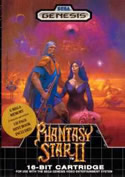 Phantasy Star II is one of those games that sparks controversy. Most people either like it or hate it, with few occupying any sort of middle ground. Regardless of how you feel about the game itself, though, the brilliance of the soundtrack is undeniable. The sheer amount of tracks in this game is insane, almost as much as their quality. It seems that there is a theme for everything; homes, towns, dungeons, and caves all have their own pieces and rarely overlap. This is one of my personal favorites and it too has been rescored many times for CD releases. The Genesis original still sounds as good to me today as it did back in ’89 and I’ve always wondered why many of the sounds and tones Bo used in PS II‘s music were never used anywhere else. In any case, it gives the game a certain distinction among other titles on the platform, making its score instantly recognizable.
Phantasy Star II is one of those games that sparks controversy. Most people either like it or hate it, with few occupying any sort of middle ground. Regardless of how you feel about the game itself, though, the brilliance of the soundtrack is undeniable. The sheer amount of tracks in this game is insane, almost as much as their quality. It seems that there is a theme for everything; homes, towns, dungeons, and caves all have their own pieces and rarely overlap. This is one of my personal favorites and it too has been rescored many times for CD releases. The Genesis original still sounds as good to me today as it did back in ’89 and I’ve always wondered why many of the sounds and tones Bo used in PS II‘s music were never used anywhere else. In any case, it gives the game a certain distinction among other titles on the platform, making its score instantly recognizable.
Revenge of Shinobi (Genesis, 1989)
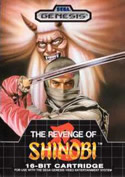 I know what you’re thinking: “Didn’t Yuzo Koshiro score this game?” Yes he did. Bo served as the sound coordinator/sound programmer for Revenge of Shinobi. He and Yuzo seemed to work very well together and it’s no wonder that their collaborations produced some incredible music. It’s not entirely clear what his role in the game’s production was exactly but whatever he did resulted in one of the most revered collections of tracks ever put together. The fluidity and diversity of the songs in Revenge of Shinobi is impressive, though they might seem a bit muffled by today’s standards. There have been few games to rival this soundtrack, which was like a kick in the ass from heaven when I first heard it all those years ago. I’m still searching for a re-scored CD compilation, though rumors of its existence have never been confirmed.
I know what you’re thinking: “Didn’t Yuzo Koshiro score this game?” Yes he did. Bo served as the sound coordinator/sound programmer for Revenge of Shinobi. He and Yuzo seemed to work very well together and it’s no wonder that their collaborations produced some incredible music. It’s not entirely clear what his role in the game’s production was exactly but whatever he did resulted in one of the most revered collections of tracks ever put together. The fluidity and diversity of the songs in Revenge of Shinobi is impressive, though they might seem a bit muffled by today’s standards. There have been few games to rival this soundtrack, which was like a kick in the ass from heaven when I first heard it all those years ago. I’m still searching for a re-scored CD compilation, though rumors of its existence have never been confirmed.
Sorcerian (Mega Drive, 1989)
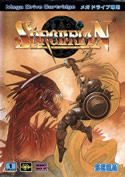 Here’s a game that not many people know about. Those that have played it are usually quite expressive in their distaste for the text-heavy Japanese side-scroller. As action games go, Sorcerian is a title that never got the attention it deserved due to the language barrier and anyone who managed to get into it will probably tell you it wasn’t nearly as bad as it’s been said to be. Musically, the game is pretty solid, although it isn’t in the same class as many of the other games listed here. I have seen conflicting reports that put both Bo and Yuzo as composers for Sorcerian and it may be possible that they also collaborated on this title. Bo is listed as a scenario writer, however. Recently re-released on Dreamcast in Japan, it’s uncertain if the original score was maintained or if the soundtrack was redone.
Here’s a game that not many people know about. Those that have played it are usually quite expressive in their distaste for the text-heavy Japanese side-scroller. As action games go, Sorcerian is a title that never got the attention it deserved due to the language barrier and anyone who managed to get into it will probably tell you it wasn’t nearly as bad as it’s been said to be. Musically, the game is pretty solid, although it isn’t in the same class as many of the other games listed here. I have seen conflicting reports that put both Bo and Yuzo as composers for Sorcerian and it may be possible that they also collaborated on this title. Bo is listed as a scenario writer, however. Recently re-released on Dreamcast in Japan, it’s uncertain if the original score was maintained or if the soundtrack was redone.
ESWAT: City Under Siege (Genesis, 1990)
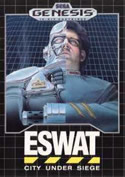 Ported from the arcade, ESWAT is another title that bears little resemblance to the source material. In fact, it’s a completely different game than the arcade title that spawned it. Bo was the game’s sound coordinator and I consider it to be his weakest work. The soundtrack isn’t necessarily bad; it simply fails to stand out as much as the other games Bo did, especially for Genesis. Subdued and almost bland, the music does little to motivate. This adds to the already sub par game play and ho-hum graphics, resulting in a thoroughly mediocre product. I bought this game along with Castle of Illusion and there is no comparison to the quality of the music. I refuse to place the blame on Bo alone, as he was not the one who scored ESWAT. I do think, that given his reputation by this point, as well as his raw talent, it should have been better.
Ported from the arcade, ESWAT is another title that bears little resemblance to the source material. In fact, it’s a completely different game than the arcade title that spawned it. Bo was the game’s sound coordinator and I consider it to be his weakest work. The soundtrack isn’t necessarily bad; it simply fails to stand out as much as the other games Bo did, especially for Genesis. Subdued and almost bland, the music does little to motivate. This adds to the already sub par game play and ho-hum graphics, resulting in a thoroughly mediocre product. I bought this game along with Castle of Illusion and there is no comparison to the quality of the music. I refuse to place the blame on Bo alone, as he was not the one who scored ESWAT. I do think, that given his reputation by this point, as well as his raw talent, it should have been better.
Castle of Illusion Starring Mickey Mouse (Genesis, 1990)
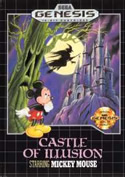 I cannot say enough about this game. One of the best games in the Genesis library and definitely Mickey’s finest moment, Castle of Illusion gives no quarter in any category. Incredible graphics, rock-solid game play, and an incredible soundtrack create a wonderful gaming experience no one should miss. As the game’s composer, Bo demonstrated that he was still a force to be reckoned with in the industry’s musical circles. Tunes range from bouncy, cartoony melodies to dramatic and adventurous tones; there’s even a jig! Bo outdid himself and made the Genesis sing like no one else ever could, and his incredible score holds up incredibly even today. There’s something to be said about a soundtrack that perfectly captures the charm and warmth of America’s most famous mouse, and I’m sure Walt would be proud.
I cannot say enough about this game. One of the best games in the Genesis library and definitely Mickey’s finest moment, Castle of Illusion gives no quarter in any category. Incredible graphics, rock-solid game play, and an incredible soundtrack create a wonderful gaming experience no one should miss. As the game’s composer, Bo demonstrated that he was still a force to be reckoned with in the industry’s musical circles. Tunes range from bouncy, cartoony melodies to dramatic and adventurous tones; there’s even a jig! Bo outdid himself and made the Genesis sing like no one else ever could, and his incredible score holds up incredibly even today. There’s something to be said about a soundtrack that perfectly captures the charm and warmth of America’s most famous mouse, and I’m sure Walt would be proud.
Quackshot Starring Donald Duck (Genesis, 1991)
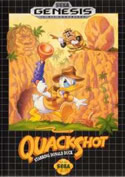 Donald has never willingly taken a back seat to Mickey Mouse. Released a year after Castle of Illusion, Quackshot went in a different direction, adding semi-linear game play and a working inventory. The graphics were cleaner and more colorful and while the music was excellent, it couldn’t touch Mickey’s soundtrack. It seemed Donald would have to settle here. Serving as sound producer, Bo oversaw Kamiya Studios’ scoring of the game, which turned out better for him than ESWAT. Not many people are aware of his participation in Quackshot and unless you actually finish the game, you won’t see his name at all (which was the case in virtually all the games he was involved in). Though not on par with Castle of Illusion, the music here is very, very good. Themes are varied and clean and are reminiscent of the tunes heard in the Ducktales cartoon. Great stuff that definitely should be heard.
Donald has never willingly taken a back seat to Mickey Mouse. Released a year after Castle of Illusion, Quackshot went in a different direction, adding semi-linear game play and a working inventory. The graphics were cleaner and more colorful and while the music was excellent, it couldn’t touch Mickey’s soundtrack. It seemed Donald would have to settle here. Serving as sound producer, Bo oversaw Kamiya Studios’ scoring of the game, which turned out better for him than ESWAT. Not many people are aware of his participation in Quackshot and unless you actually finish the game, you won’t see his name at all (which was the case in virtually all the games he was involved in). Though not on par with Castle of Illusion, the music here is very, very good. Themes are varied and clean and are reminiscent of the tunes heard in the Ducktales cartoon. Great stuff that definitely should be heard.
Sonic The Hedgehog 3 / Sonic & Knuckles (1993, 1994)
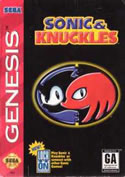
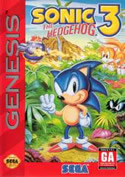 Bo worked on both of these titles as a member of Sega Sound Team and, which was composed of about eight people. Many people feel the music in both games is not on the same level as that of the first two of the series. I liked them, especially Sonic 3 (my favorite game in the series after Sonic CD) but I do admit they aren’t as good. From what I have gathered, Bo seems to do better when he works alone, as seen by the games detailed above. It is a credit to his talent that even when part of a time, he’s never really composed a bad soundtrack. The problem I have with these two Sonic titles is that by this stage in the Genesis’ life span, there really wasn’t much innovation made in maximizing the capabilities of the system’s sound chip. If developers had taken the same chances with the audio that they took with graphic effects and shadowing to improve the color display, the overall quality of the music could probably have been greatly improved. As I said about Phantasy Star II, many of that game’s sounds and tunes were never used again, which was a shame, as games such as the Sonic series could have used the audial change.
Bo worked on both of these titles as a member of Sega Sound Team and, which was composed of about eight people. Many people feel the music in both games is not on the same level as that of the first two of the series. I liked them, especially Sonic 3 (my favorite game in the series after Sonic CD) but I do admit they aren’t as good. From what I have gathered, Bo seems to do better when he works alone, as seen by the games detailed above. It is a credit to his talent that even when part of a time, he’s never really composed a bad soundtrack. The problem I have with these two Sonic titles is that by this stage in the Genesis’ life span, there really wasn’t much innovation made in maximizing the capabilities of the system’s sound chip. If developers had taken the same chances with the audio that they took with graphic effects and shadowing to improve the color display, the overall quality of the music could probably have been greatly improved. As I said about Phantasy Star II, many of that game’s sounds and tunes were never used again, which was a shame, as games such as the Sonic series could have used the audial change.
In addition to the games listed in this feature, Bo also served in some capacity of supervision or was thanked in the following games: Panic!, Battle Golfer Yui, Streets of Rage, and Phantasy Star IV.
Sources:
- Algol Star System. Developer Information, Tokuhiko Uwabo.
- Arcade History Database. Tokuhiko Uwabo.
- Genesis Collective. Box shots and miscellaneous information.
- Moby Games. Rap Sheet, Tokuhiko Uwabo.

Pingback: Phantasy Star – 1993 Developer Interview - shmuplations.com